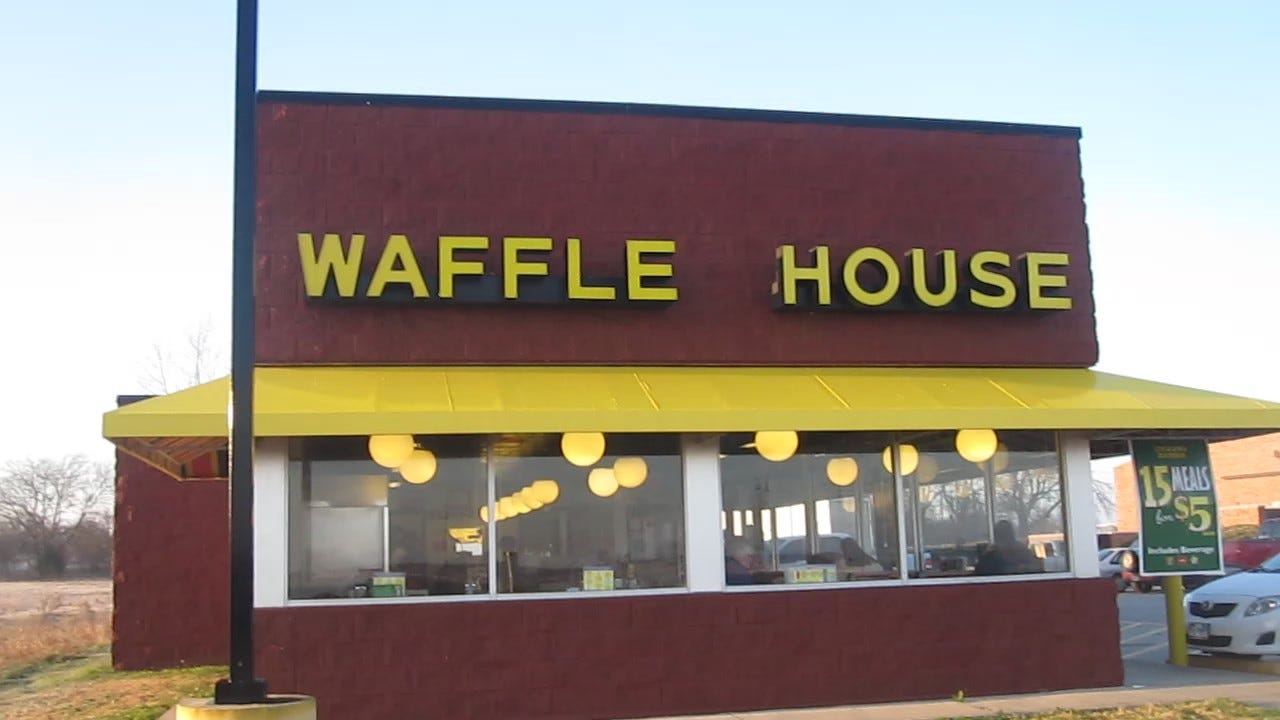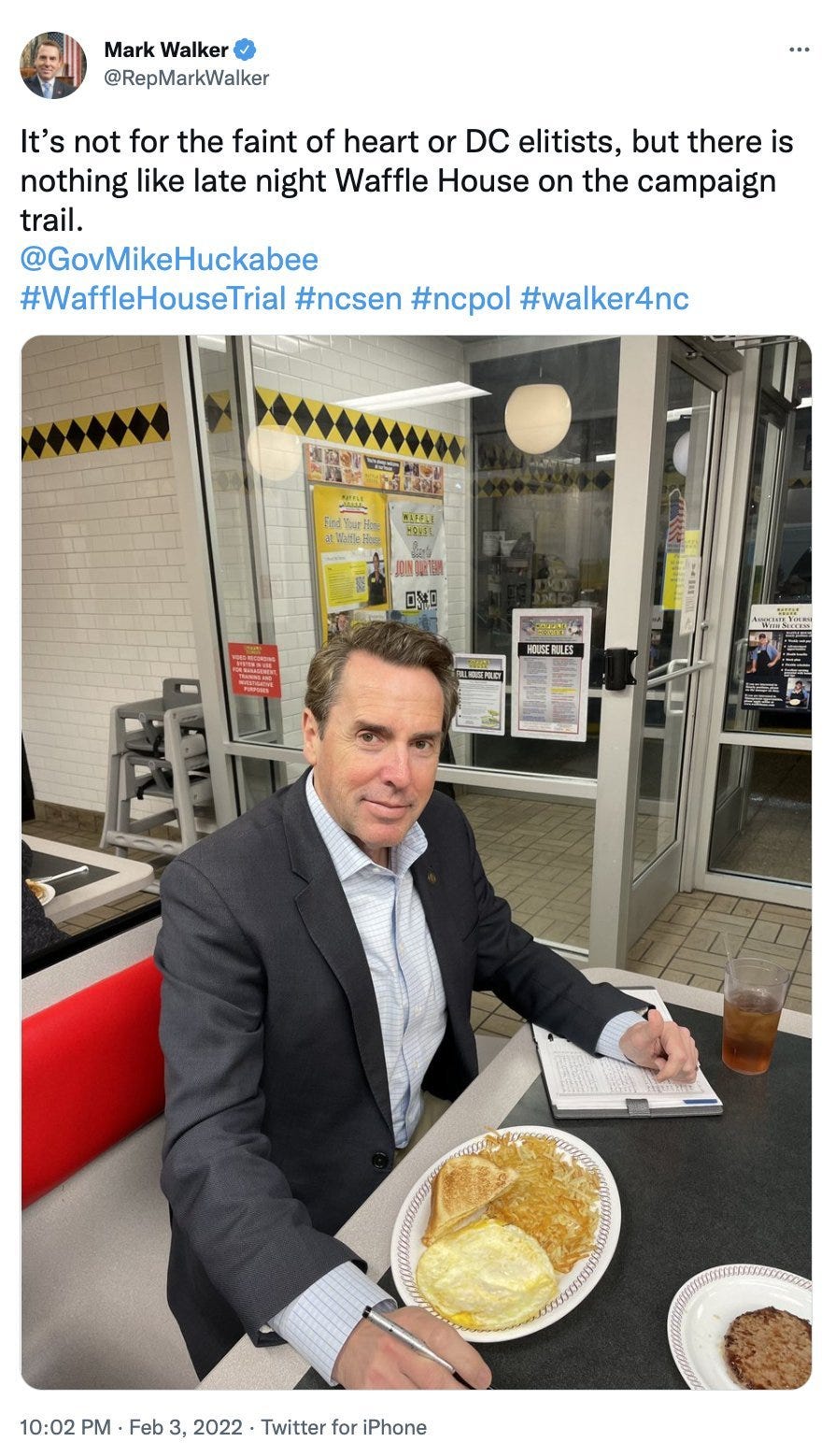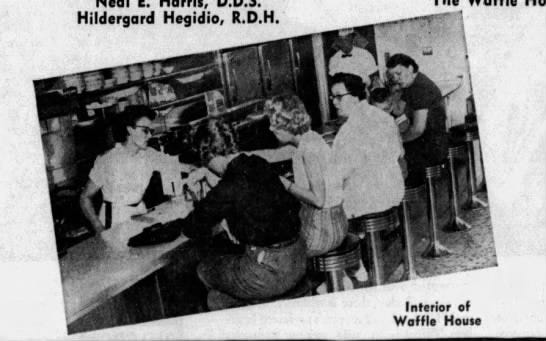
One way to think about Waffle House is as a semiotic mirror image of Starbucks. If the Starbucks brand is Northwestern and cosmopolitan, Waffle House is Southeastern and suburban. Starbucks used to sell Joni Mitchell CDs at the cash register; Waffle House has a jukebox that plays “There Are Raisins in My Toast.”
The media love affair with Waffle House began in the early ‘90s, best I can tell. Of course weary travelers, SEC football fans, and long-haul truckers already had an abiding affection for the chain of 24-hour diners at the time, but the first mainstream paean to Waffle House I can find was published August 10, 1992, penned by the syndicated humor columnist Lewis Grizzard. He wrote that it was the kind of place where nobody batted an eye when he picked up a T-bone steak and gnawed off the last scraps of meat.
Some newspapers ran the piece with a headline playing up a political angle: “Maybe Waffle House cooks could help us in Congress.” Politics came up in this section, halfway down:
Waffle House cooks have wonderful memories. They can be frying six eggs, four pieces of bacon and have two waffles in the iron at the same time and listen to three waitresses yelling out orders and it all registers and they rarely get an order wrong.
There ought to be a lot of ex-Waffle House cooks in Congress. Maybe they wouldn’t forget what the voters elected them to do.
This was a throwaway observation, a rare miss from the Georgia man of letters. But it established a certain folksy feeling that politicians and celebrities have tried to channel ever since while posing for pictures at Waffle House restaurants across the Southeast.
The saddest pandering I have seen this month came courtesy of former Congressman Mark Walker (R-NC), who is currently running for Senate. On Feb. 3 he posted a picture of himself eating the palest dinner imaginable at a Waffle House.
“It’s not for the faint of heart or DC elitists, but there is nothing like late night Waffle House on the campaign trail,” Walker said in a tweet, which he later deleted. In response, people roasted him so hard it made the local TV news. I thought Ed Burmila summed up the backlash succinctly:
“Yes, people are dumb but people also broadly detest being pandered to and you have to wonder how much more mileage these marshmallow-soft white people can get out of trying to make the simplest things they do sound like a life-threatening act of civil disobedience.”
The one politician who I suppose has a legitimate claim to Waffle House cred is Congresswoman Nancy Mace (R-SC), who briefly worked at a Waffle House in Ladson after dropping out of high school in the ‘90s. At age 44, she continues to make that job a part of her public persona. When she flipped South Carolina’s 1st Congressional district in 2020, she gave her victory speech at the location where she used to work.
Mace refers to herself as a former Waffle House waitress in her Twitter bio and in the third paragraph of her Congressional biography. She clearly thinks it’s a potent signifier. Today I want to consider what it signifies.
Long before Anthony Bourdain had a religious experience at a Charleston Waffle House, before John T. Edge waxed poetic about its enduring appeal, and before the Wine + Food Festival hosted a WaHo-themed celebrity cookoff, Waffle House was there for people when they needed cheap food fast at odd hours. From its first location in the Atlanta suburbs in 1955, the company has built a brand on consistency, hospitality, and not much else.
Waffle House serves a purpose. Once, after covering Jeb Bush’s abysmal 2016 primary campaign on a day-long slog across South Carolina, I sat in a Waffle House outside Myrtle Beach and banged out a report on my laptop while eating my first real meal of the day. The waitress kept the coffee coming and didn’t ask a lot of questions.
I am going to say some harsh things about Waffle House today. This pains me a little, given the fond memories I have made there over the years.
The food is not great, objectively speaking. It’s fine, if greasy. My first childhood memory of heartburn was on a family road trip, chewing Tums in the back of a Taurus station wagon after wolfing down a side of sausage patties. I’m a parent now, and one of my favorite cheap dates with my children is to sit in a booth and let them go wild on chocolate chip waffles while I drink from a bottomless cup of black coffee.
What I want to address today is the way that Waffle House became a lazy shorthand for “blue collar.” In a country that is more or less allergic to class analysis, it’s getting way too easy for people to earn working-class Southern credibility by rolling up their sleeves at a Waffle House counter and talking to a camera crew about hashbrowns.
The first Waffle House political stunt I can find happened on the presidential campaign trail in October 1992, two months after Grizzard’s column ran (probably a coincidence). The incumbent President George H.W. Bush, a Yale-educated son of Massachusetts gentry, made a conspicuous breakfast stop at a Waffle House in Spartanburg, S.C., apparently to make a visual pun about his opponent’s “waffling” on contentious topics.
AP correspondent Terence Hunt wrote:
Bush and his son Marvin took two seats at the counter and were served scrambled eggs, bacon, waffles, syrup and coffee. Bush loaded the butter on his waffle, drank most of his milk and ignored his eggs.
“This is just like the Clinton White House,” spokesman Marlin Fitzwater said. “They have a limited menu and they cook it all different ways.”
Bill Clinton’s campaign fired back shortly afterward, handing out parody laminated menus to reporters with items like “Iraq of Lamb,” “Jobs on the Short Side,” and “Deep Voodoo Pie” (not so sure about that last one). Cornball behavior all around, if you ask me.
Running parallel to Waffle House’s development as a political signifier, the restaurant was making its mark on the culture. The comedian Bill Hicks had a standup bit about anti-intellectualism at a Nashville Waffle House. In the movie Tin Cup (1996), Kevin Costner’s rough-around-the-edges golfer character celebrates a win at a Waffle House (“I’m a Waffle House guy, gotta stay in touch with that,” he drawls). The star-studded comedy ATL (2006) features a group of Atlantans in a Waffle House booth talking trash about New York City.
Fast-forward to the 2010s, and we were approaching peak Waffle House media saturation. Let’s revisit Bourdain’s rhapsody for a Charleston Waffle House during a 2015 episode of Parts Unknown:
It is indeed marvelous, an irony-free zone where everything is beautiful and nothing hurts — where everybody, regardless of race, creed, color, or degree of inebriation, is welcomed — its warm yellow glow a beacon of hope and salvation, inviting the hungry, the lost, the seriously hammered all across the South to come inside, a place of safety and nourishment. It never closes. It is always, always faithful, always there for you.
To put it less artfully, a lot of people have warm memories at Waffle House because someone working there was nice to them while they were drunk and gave them carbs. There’s something to be said for that.
I need to fact-check something, though: Waffle House does not have a sterling reputation for serving “everybody, regardless of race.” In 2005, Black customers in four different states filed lawsuits against the company claiming that servers used racial slurs, refused to serve them, and deliberately served unsanitary food to minority customers. In 2018 at a Waffle House in Saraland, Alabama, cops were caught on video wrestling a Black woman to the ground and tearing her dress off after she argued with staff about charging money for plastic utensils.
The company has also been accused of wage theft and unfair labor practices, such as requiring employees to sign arbitration agreements so they can’t file class action lawsuits.
You will probably not be shocked to learn that Waffle House Inc. is a Republican company at the executive level. Former company VP Don Balfour II was the longest-serving Republican in the Georgia Senate until he left office in 2014. The company’s political action committee (of course it has a PAC) gives money exclusively to Republican candidates and dumped $100,000 into Karl Rove’s American Crossroads PAC in 2012.
The list of candidates getting smothered and covered in Waffle House cash includes Rep. Nancy Mace. Waffle House gave $5,000 to her re-election fund in 2021.
The working-class affectations of a politician like Mace break down as soon as you look at her voting record. Yes, she worked at a Waffle House as a teenager, but as an adult she consistently pursues the goals of management, not the coworkers she left behind. She voted against COVID relief, Build Back Better, the John Lewis Voting Rights Advancement Act, and the Protecting Older Workers Against Discrimination Act.
In the absence of a plan to improve the conditions of workers, all that’s left is empty signifiers. Waffle House is nothing without its workers.
***
If you want to catch up to speed on the Starbucks unionization wave, DSA is hosting a video call with Starbucks labor leaders in Chile and the U.S. tonight at 7 p.m. Eastern. Sign up here if you want to listen in. Waffle House, you’re next.
In other news, all of the South Carolina Republican education bills I wrote about last week (the private school voucher bill and the five teacher censorship bills) were approved in committee hearings. The fight continues. I’ve submitted a new Freedom of Information Act request for emails regarding “critical race theory,” which came up during Superintendent Molly Spearman’s testimony last week. You can read my previous coverage below. I’ll share the results of this new FOIA request as soon as I get a response.
Brutal South is free. If you would like to support my work, get some cool stickers in the mail, and get access to the complete archives, you can become a paying subscriber for $5/month.
Bookshop // Twitter // Bandcamp // Apple Podcasts // Spotify Podcasts









Clinton's “Deep Voodoo Pie” refers to HW Bush's older slogan, "It's Voodoo Economics!". Bush used that when running against Ronald Reagan in the 1980 Repub primaries.
Truly a warm yellow beacon of salvation. For all its flaws perhaps WH = America